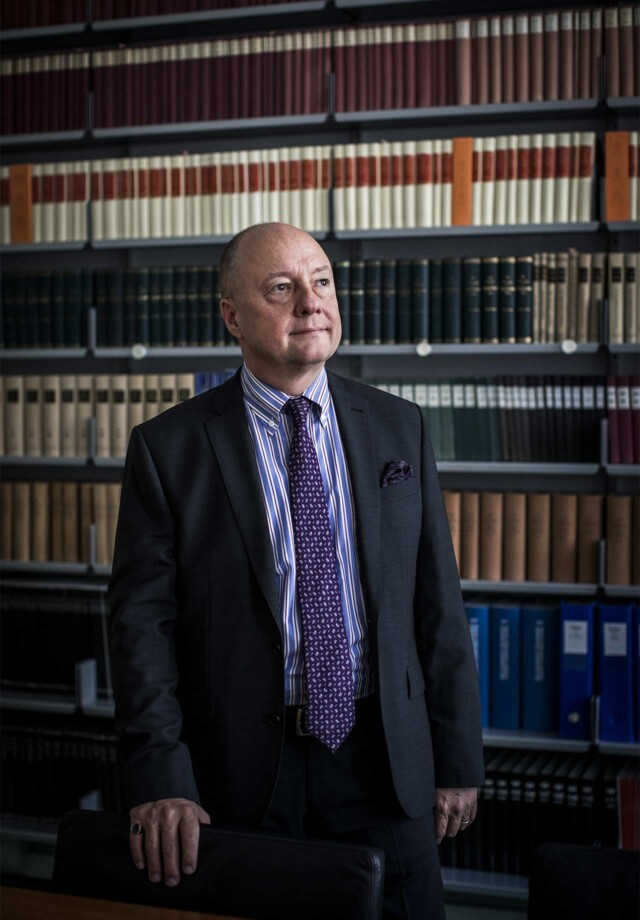At the end of February 2019, the Federal Council suggested making charitable foundations and clubs subject to the automatic exchange of information (AEOI) for tax-related matters. In other words, the existing exemption that applied to them was to be removed. On 20 November 2019 the Federal Council then announced the exemption would remain in place. Numerous participants in the consultation, particularly the proFonds and SwissFoundations associations, had firmly voiced their objection to the exemption being lifted.
The Philanthropist: Mr Degen, in your press release dated 20 November 2019, you wrote: ‘The danger has passed, for the time being.’ Why ‘for the time being’?
Christoph Degen: ‘For the time being’ means that the Federal Council decided that subjecting charitable organisations and clubs to the AEOI would be a political no-go, once the consultation had been concluded and assessed. Influential political parties, associations and all kinds of communities stood shoulder to shoulder in their opposition to this. As a result, the decision was made not to continue with lifting the exemption for the time being.
TP: Do you think there is the risk that this exemption might be removed anyway?
CD: The OECD may well continue to put pressure on the Federal Council. The Federal Council can try to convince the OECD to change its own legal basis, known as the Common Reporting Standards, by collaborating with other countries in the same situation. If they manage to enshrine an explicit exemption for charities and clubs in these standards, the topic would be off the table – for good.

TP: What are these other countries you’re talking about?
CD: Germany is a key ally for Switzerland, and Germany is also making charitable foundations and clubs exempt from the AEOI. It looks like the OECD has not yet set our neighbour in its sights, but they are helping us with our exemption provisions by including an explicit exemption from the AEOI in the Common Reporting Standards. This is because the AEOI hopes to fight tax evasion at international level. As a result, the two states both have to show that neither Swiss nor German charities are structurally well-suited to tax evasion. If there is no way to evade taxes, making the charities subject to the AEOI would be utterly pointless: it would simply be art for art’s sake.
TP: Are there any other ways to handle this?
CD: Yes. proFonds has started work to enshrine the exemption from the AEOI in law. In the previous legislature, the former National Councillor Hans-Ulrich Bigler submitted this request in the form of a motion. The Federal Council is to be asked to propose that parliament regulate the exemption on a legislative level. To date, the AEOI exemption for charities and clubs has existed as an ordinance, meaning that it was decreed by the government.
TP: Has the motion been handed down?
CD: The Bigler motion is being processed and has not yet been handed down.
TP: In the worst-case scenario, what would happen if charities were subject to the AEOI?
CD: Primarily, it would lead to a mountain of administration, and have a major impact on costs. The Federal Council assumes that one-off introductory costs would amount to between 5,000 and 10,000 Swiss francs, plus annual costs of the same amount.
My own small charity, ‘Laurenz für das Kind’, gives out 30,000 to 40,000 Swiss francs in funding each year, so the AEOI would mean that 5,000 to 10,000 Swiss francs would not go towards fulfilling its charitable objectives. That’s simply unacceptable.
TP: Regardless of the political decision, charities have faced criticism for dodging the taxman. Wouldn’t charities have a vested interest in transparency?
CD: It’s not true that they’re dodging the taxman. The money that donors donate is irrevocably given over to the charity’s objectives. The donor can’t take it back! However, for other reasons, it would certainly be desirable if charities could provide more information about the things they do for our society, culture, academia, social issues and the environment. Many charities are invisible, or barely visible. This is so they no longer receive requests that they’re unable to process without having a professional administrative office. Transparency and clear communication would mean many of these unsuitable requests would dry up. However, this is all a private matter: it is up to the charity, and the charity alone, to decide whether to be visible, and if so, in what form. That said, they do, of course, have to be transparent towards the supervisory authorities and the tax office.
TP: In addition to the consultation on the AEOI, there was some more positive news for you: the Luginbühl parliamentary initiative was sent out for consultation. You played an active role in identifying and developing the matters that this initiative focuses on, with the aim of making Switzerland a better location for charities.
CD: The parliamentary group for philanthropy and charities, previously led by former member of the Upper Chamber Werner Luginbühl and former National Councillor Fulvio Pelli (President) and containing members from every party in the Federal Council, commissioned a group of experts to consider how to make Switzerland an even better location for charities.
TP: What are their core concerns? Are they hoping that charity law will be completely revised?
CD: Absolutely not! Charity law is reliable and sound. Instead, it’s about making a handful of targeted improvements, with practical solutions to meet real needs and overcome genuine challenges. There are eight areas that need to be adjusted. The parliamentary group on philanthropy reviewed the measures to ensure they were pragmatic, and they are now the focus of the Luginbühl parliamentary initiative.
TP: Couldn’t the authorities or the courts handle these points in their work?
CD: The group of experts is utterly convinced that legislators need to get involved. Some of the solutions they’ve suggested absolutely need a legal basis. In other cases, we’ve known about the problem for years but the authorities and courts have not fixed it and they haven’t changed what they do in practice.
TP: Can you give us an example?
CD: One point relates to the payment of an appropriate fee to trustees or members of a club’s board. Some cantonal tax authorities think that these bodies need to be voluntary for them to keep their tax-exempt status: expenses can be reimbursed, but fees cannot be paid to anyone. Some even request that this voluntary approach is expressly stated in the charity’s statutes. However, tax law does not require these bodies to operate on a voluntary basis. It is only the charity itself that is not allowed to make a profit or work for its own gain.
TP: Are there enough voluntary trustees to fill these time-intensive positions?
CD: Across Switzerland, we need around 70,000 trustees and 600,000 association board members, and it is becoming ever harder to find people prepared to sit on these bodies on a voluntary basis. I believe that strategic management bodies should be up to their task, both for charities and clubs alike. Ultimately, not everyone can afford to work for free, and in line with this, it should be possible for these people to receive adequate recompense – they don’t have to be paid, but the option should be there. Strategic management bodies hold a great deal of responsibility: they bear full liability with their personal assets, and today they can even be taken to court for ordinary negligence.
TP: Does that mean that you might be asked to put your hand in your pocket, even if you’re in a voluntary position?
CD: Yes, that’s right. That’s something we want to change: in a voluntary position, people should be exempt from liability for ordinary negligence, but if trustees and board members are paid a fee, they should still be liable for ordinary negligence.
TP: That sounds like a sensible request…
CD: … in our experience, many tax authorities are not interested in changing how they do things. This mantra that these bodies need to be voluntary was even cemented in the practical notes issued by the Swiss Tax Administrators’ Conference. But it simply cannot be right that tax authorities should remove a charity’s tax exemption if it pays a fee to the skilled members needed for these bodies. This is based on a misunderstanding: the organisation itself needs to operate along charitable lines, not the individual members of its bodies.
TP: You’re asking for this to be enshrined in law?
CD: Exactly! We cannot allow the payment of an appropriate fee to be a reason to deny or remove a charity’s tax-exempt status. That’s why the committee of experts and the legal commission are firm in their belief that we need legislators to get involved.
TP: What’s next on the agenda?
CD: The draft bill is now undergoing consultation until 13 March 2020. Then, the responses to this consultation will be assessed and the bill will return to parliament.
TP: In the years to come, will there be any developments we should note in terms of the charitable sector?
CD: Over the next few decades, people are going to be leaving huge amounts of money in their wills. The people inheriting these bequests are often of an age when they don’t need (all) the money for themselves. proFonds is very keen that a substantial part of these assets take the form of charitable donations or be used for founding charities.
TP: What kind of numbers are we talking about?
CD: At present, we can assume that these assets run to around 100 billion Swiss francs – and the trend is heading upwards.
TP: What measures do you foresee?
CD: There should be incentives like special tax allowances for donations and charities in terms of money received as a bequest. In other words, the donation allowance’s existing limit, capped at 20 percent of the donor’s income, should be lifted. These special allowances can only be brought into effect by changing the law. In short, I believe that there is no doubt that we need legislation to effectively implement the Luginbühl parliamentary initiative. Anything other than that would be misreading both the facts and the legal situation.
Members of the group of experts for the Luginbühl parliamentary initiative:
Professor Georg von Schnurbein, CEPS, University of Basel, Professor Dominik Jakob, Center for Foundation Law, University of Zurich, Professor Hans Lichtsteiner, VMI, University of Freiburg, Dr Christoph Degen. proFonds, the umbrella association for Swiss charities
Christoph Degen has been Managing Director of proFonds, the umbrella association for Swiss charities, since 1990. He works as an attorney-at-law at DUFOUR Advokatur, and also lectures at the Center for Philanthropy Studies (CEPS) at the University of Basel and the Institute for Research on Management of Associations, Foundations and Co-operatives (VMI) at the University of Freiburg. He sits on various boards of trustees, and founded the charity ‘Laurenz für das Kind’ alongside his wife. www.profonds.org www.profonds.org


